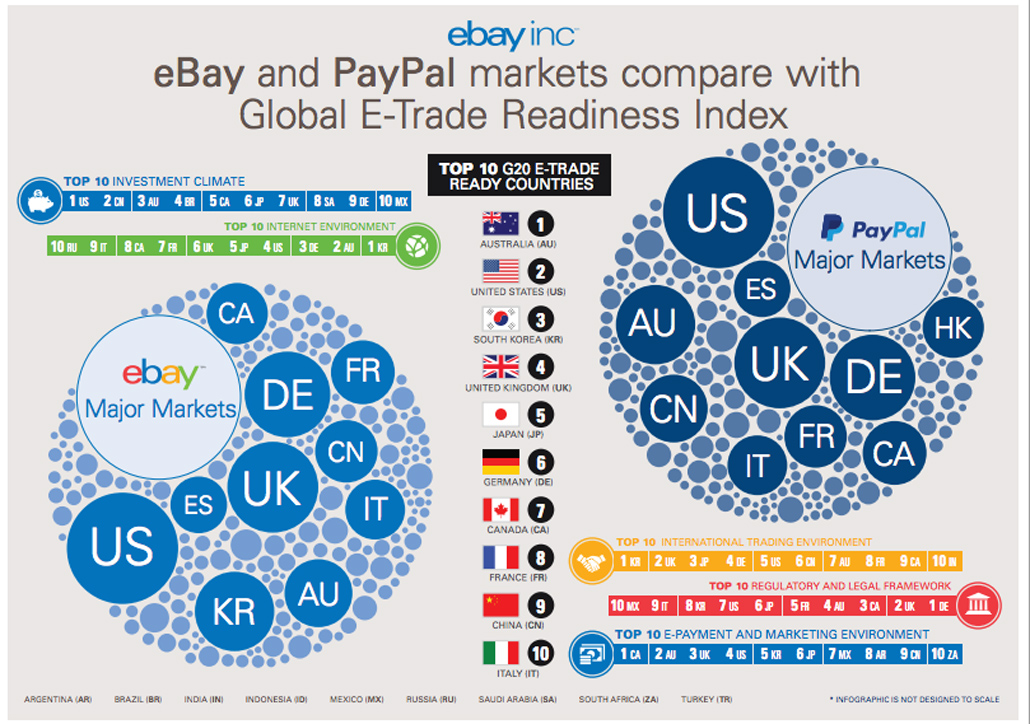As commerce is changing and new players are entering the stage through Internet platforms, eBay Inc. is focused on helping small and medium sized businesses access global markets. That’s why we commissioned the Economist Intelligence Unit (EIU) to identify the factors contributing to more seamless global trade and publish the first-ever G20 e-Trade Readiness Index.
The G20 e-Trade Readiness Index looks at five factors that contribute to overall e-trade readiness: investment climate, Internet environment, international trading environment, regulatory and legal framework, and e-payments environment.
Despite the tyranny of distance, Australia emerged on top of the rankings due to affordable Internet access, a well-developed regulatory framework, and high usage of smartphones and e-payments.
This news surfaces at a time when Australia plays host to G20 leaders this year, and G20 trade ministers will be meeting one another in a few days.
But strength emerged across the globe. South Korea topped the rankings for its strong Internet connectivity, the United States for its investment climate, Germany for its legal and regulatory framework and Canada for e-payments. The G20 e-Trade Readiness Index also revealed that China’s potential is large but is hindered by regulatory challenges.
These rankings are consistent with our company’s data. Businesses from countries that fared better in the G20 e-Trade Readiness Index are demonstrating the highest proclivity for global trade on eBay and PayPal.
But despite the positive global trends identified in the research and within our own businesses, there continue to be friction points that slow the flow of global trade. The research shows:
- Shipping rules that were designed for large companies to send bulk packages need to be revised to better facilitate small business trade. Postal systems should also consider programmes that make international shipping easier, more trackable and less costly.
- Companies may have to overcome potentially burdensome in-country data regulations. If countries implement laws that restrict cross border data flows, such as the requirement to store data in-country, compliance costs could be overwhelming for all global companies. When the cost of storing, using and securing global data goes up, our economy suffers the consequences by limiting the potential for investing in new markets.
- Careful attention must be paid to the dynamic between prudent regulation and openness to innovation and trade. The potential for a new wave of cross-border commercial and economic opportunity for the vast majority of businesses the world over should be an increasingly important consideration for policymakers looking for new, broad-based economic growth. Small and medium sized businesses are continuing to integrate information and communications technology into their business models – and they need the global policies to adapt and adjust to this new global, data driven market.
- There is still work to be done to bridge digital divides. Fast and reliable Internet access is critical to tapping this growth opportunity. We also need policies around the world that help businesses and employees equip themselves with digital skills to leverage this access to global markets.
For the first time in history, small and medium-sized businesses are competing on a global scale, with large multinationals – and they’re frequently using our platforms to access these markets. Recent research from the McKinsey Global Institute showed that more than 90 percent of the small businesses on eBay export. Additionally, PayPal’s PassPort program helps small businesses tap into the global trade revolution by providing tools on global commerce cycles and sales trends in specific markets. Through eBay Inc.’s online platforms, every entrepreneur armed with technology can connect with technology-enabled consumers anywhere in the world.
We’re here to help solve the challenges that these businesses face and together grow our businesses. Our teams are actively working across borders, geographies and cultures to continue to reduce friction points and barriers to entry for consumers of all backgrounds and merchants of all sizes, add additional participants into the global economy, and create new connections between them. Our vision for a more connected form of commerce is one that is more inclusive, open, and diverse – and e-trade readiness is at the core of making the vision a reality.



